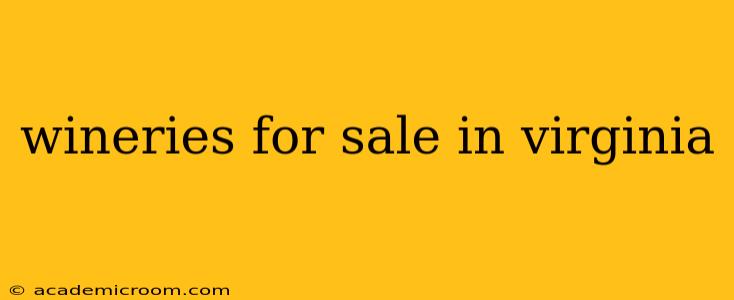Virginia's wine industry is booming, making it an attractive market for those looking to invest in a winery or vineyard. From the rolling hills of the Shenandoah Valley to the coastal plains of the Eastern Shore, Virginia offers diverse terroir and a growing reputation for producing high-quality wines. However, buying a winery is a significant undertaking. This guide will help navigate the process, exploring key considerations and answering frequently asked questions.
What are the different types of wineries for sale in Virginia?
Virginia's wine market encompasses a variety of winery types, each with its own unique appeal and challenges. You'll find established, large-scale wineries with extensive production capabilities and brand recognition. These often command higher prices but offer immediate revenue streams and established distribution networks. Conversely, smaller, boutique wineries may require more hands-on management and investment but can offer a more intimate and potentially more profitable experience. Some wineries for sale might be turnkey operations, ready to produce and sell wine immediately, while others may require significant renovation or replanting of vines. Finally, some listings may include additional assets, such as tasting rooms, event spaces, or on-site accommodation, adding to their value and potential revenue streams. It's crucial to carefully assess your investment goals and resources when considering the type of winery that best suits your needs.
What is the average price of a winery in Virginia?
The price of a Virginia winery varies drastically, depending on several key factors: the size of the vineyard, existing infrastructure (tasting room, equipment), annual production volume, brand recognition and established distribution channels, and the location of the property. A small, boutique winery might be listed for several hundred thousand dollars, while a larger, established winery could fetch millions. Thorough due diligence and professional valuation are essential to ensure you're paying a fair market price. Real estate values also play a significant role, with prime vineyard locations commanding higher costs. It's prudent to work with a qualified broker specializing in winery sales to gain a clear understanding of current market values and identify suitable properties within your budget.
What factors should I consider when buying a Virginia winery?
Beyond the purchase price, numerous crucial factors influence a successful winery acquisition. Thorough due diligence is paramount. This includes reviewing financial records, examining soil and vine health, assessing equipment condition, and evaluating the winery's marketing and distribution strategies. Understanding the legal and regulatory landscape is also vital. Virginia has specific regulations governing wine production, licensing, and sales, and ensuring compliance is non-negotiable. Market analysis is critical; evaluating the local market's demand, competition, and potential for growth is essential for long-term success. Finally, securing appropriate financing is a key step. Many wineries require significant capital investment, and arranging financing from banks or private investors should be part of the overall acquisition strategy.
What are the licensing requirements for owning a winery in Virginia?
The Virginia Alcoholic Beverage Control Authority (ABC) governs all aspects of alcohol production and sales within the state. Obtaining the necessary licenses is a crucial step before operating a winery. These licenses cover various aspects, including production, distribution, and on-site sales, and each has specific requirements and fees. It's essential to work closely with the Virginia ABC to ensure full compliance with all relevant regulations throughout the acquisition and operation of your winery. Failure to comply with these regulations can result in penalties or even closure.
What are the potential challenges of owning a winery in Virginia?
While the Virginia wine industry is thriving, it’s not without its challenges. Weather patterns, including periods of drought or excessive rainfall, can significantly impact vine health and yield. Market competition is also increasing as more wineries enter the market. Maintaining a profitable business requires strong marketing, distribution, and brand management strategies. Labor costs and availability can also present challenges, especially during peak seasons like harvest. Finally, the cyclical nature of the agricultural industry necessitates careful financial planning and risk management.
How can I find wineries for sale in Virginia?
Several avenues exist for finding wineries for sale in Virginia. Working with a specialized business broker experienced in winery sales is highly recommended. They possess extensive market knowledge, access to off-market listings, and can guide you through the entire acquisition process. Online resources, such as business brokerage websites, can also provide listings of wineries for sale. However, these often lack the detailed information and expert guidance offered by a specialist broker. Networking within the Virginia wine industry can also uncover potential opportunities not publicly advertised.
This guide provides a starting point for anyone considering purchasing a winery in Virginia. Remember that expert advice from legal and financial professionals is invaluable throughout this complex process. The rewards of owning a Virginia winery can be substantial, but thorough preparation and careful planning are crucial for long-term success.
